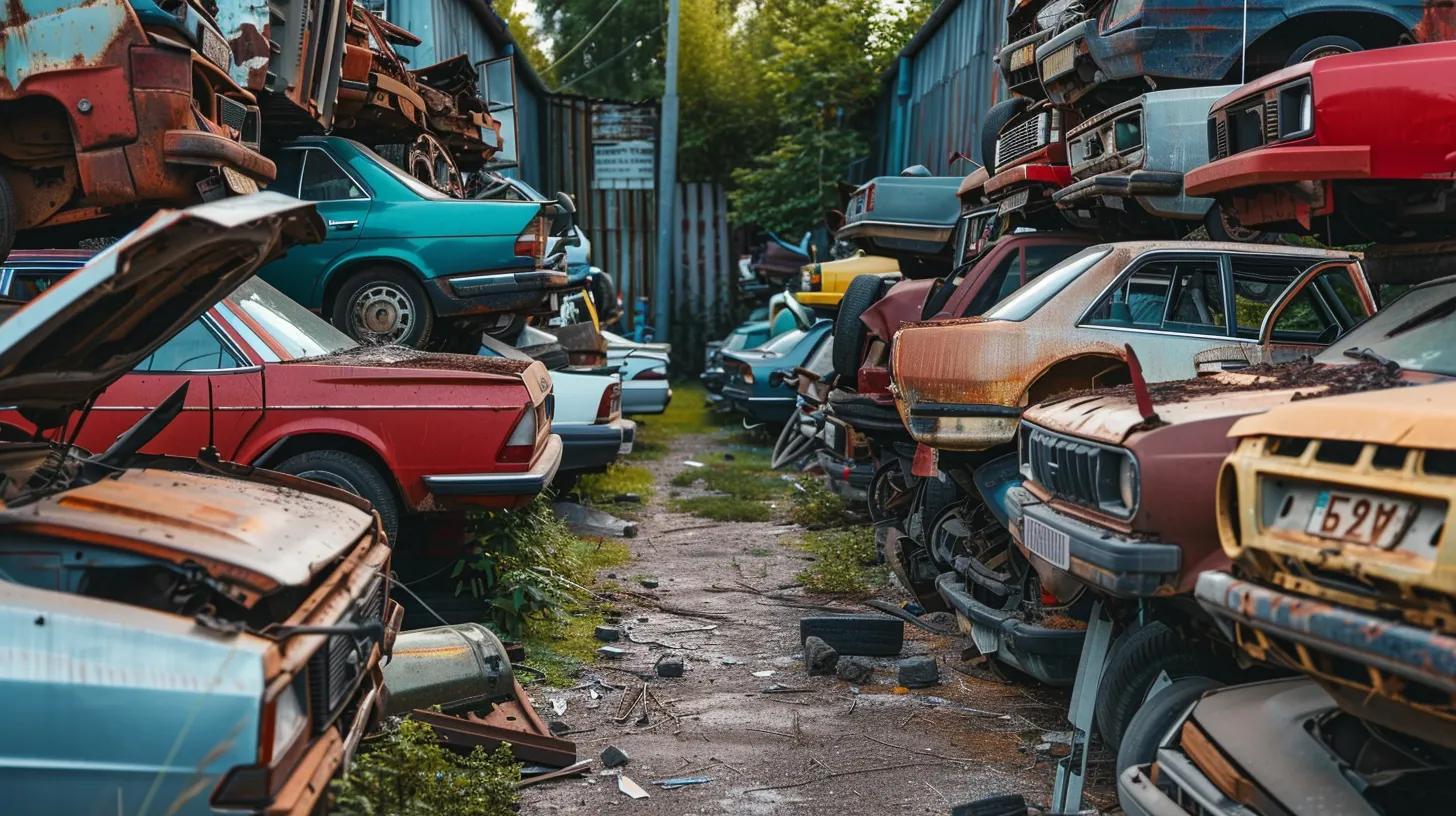This guide explains how to get cash for unwanted car by detailing the key factors that affect its cash value, the steps to clean it up for sale, and environmentally responsible disposal options. It also covers how free car removal works, ensuring that even damaged or non-running vehicles are quickly and efficiently removed. By addressing important questions about bills of sale, vehicle ownership, salvage titles, and liens, this resource helps customers secure the best cash offer. Major factors such as market value, condition of the engine and transmission, zip code, and metal composition influence the cash offer. Buyers and sellers benefit from obtaining an online quote, comparing trade-in offers from tow trucks or scrap dealers, and understanding the process from start to finish. The guide also explains how local car removal services work, what documentation is needed, and provides an overview of environmentally responsible recycling. Transitioning from selling to complete removal, you will learn about pricing, free car removal, and final cash payment—all in one resource.
What Are Unwanted Cars and Why Should You Sell Them?
Unwanted cars are those vehicles that owners no longer wish to keep, regardless of condition or functionality. They may be outdated models, non-functional vehicles, or extras that have lost their utility. Selling these cars for cash not only generates revenue from an asset that might depreciate further, but also reduces clutter, maintenance costs, and environmental risks.
What Defines an Unwanted Car?
An unwanted car is defined by its age, condition, and lack of market value. Vehicles with mechanical issues, extensive wear and tear, or cosmetic damage often discourage private buyers. For instance, a sedan with a salvage title, a non-functional engine, or a problematic transmission qualifies as unwanted. Additionally, cars that have been repossessed or have registration issues are typically unwanted. These factors lead owners to seek cash offers through scrap deals or junk car removal services.
What Are the Benefits of Selling Your Unwanted Car for Cash?
Selling your unwanted car for cash provides several benefits. It delivers immediate liquidity that can pay off debts, help invest in a more reliable vehicle, or simply free up space. By selling to a junk car removal service, you avoid the hassle of private selling, lengthy advertising efforts, and complex negotiations. Many companies offer free towing services and manage all the paperwork, making the process stress-free. Beyond financial gain, selling an old car prevents it from becoming an eyesore and supports recycling efforts where metals and other materials are repurposed, reducing environmental impact.
How Does Selling Unwanted Cars Help the Environment?
Proper disposal of unwanted cars contributes to environmental conservation. When a car is sold for cash or scrap, its metal, engine, and components are recycled. This recycling reduces the need for new raw materials, saves energy, and lowers carbon emissions from manufacturing. Removing non-functioning vehicles from the road also minimizes pollution and prevents hazardous substances, like leaking battery acid or engine fluids, from contaminating soil and water. Overall, these practices promote sustainability in the automotive industry and create a cleaner environment.
How Much Cash Can You Get for Your Unwanted Car?
Determining the cash value of an unwanted car depends on both the vehicle’s condition and market demand. Local economic conditions and specific components also play significant roles in the overall cash offer.
What Factors Affect the Cash Value of Unwanted Cars?
The cash value is influenced by the car’s age, condition, mileage, and local market demand. For example, a well-maintained sedan—even if a bit outdated—may still have higher scrap value thanks to its intact engine or transmission. In contrast, severe damage or non-functioning conditions lower the offer. Additionally, the type of metal (steel or aluminum) and the presence of valuable parts like catalytic converters or airbags can boost the offer. Factors such as zip code and proximity to recycling centers further affect pricing. Other considerations include salvage title, existing liens, and the brand and model; popular models such as a Toyota Prius or Nissan Altima may fetch a better offer.
How to Get a Free Quote for Your Unwanted Car?
Obtaining a free quote is usually a simple online process. Car removal services typically provide an instant quote feature in which you enter details such as your car’s make, model, year, and condition. Information regarding the engine, transmission, and overall exterior condition is required. This online quote system helps you compare market values and ensures that you receive the best cash offer.
How Does Cash for Cars Compare to Private Selling?
While private selling can sometimes yield a higher price, it often takes more time and effort. Cash for cars provides a fast, hassle-free alternative that eliminates the need for advertisements, negotiations, and long waiting periods. With cash offers that come with free towing and immediate payment, especially for vehicles in poor condition, cash for car services are generally preferable. They avoid the uncertainty, legal complexities, and potential hidden costs associated with private transactions.
What Is the Step-by-Step Process to Sell Your Unwanted Car?
Selling your unwanted car follows a well-defined process to help you secure the best cash offer while managing paperwork and logistics efficiently.
How to Prepare Your Unwanted Car for Sale?
Begin by assessing the overall condition of your vehicle and removing all personal items. A thorough cleaning of the interior and exterior can slightly increase the price. Collect all relevant documents such as the car title, bill of sale from previous transactions, and maintenance records. If your car has a salvage title or outstanding liens, make sure these details are documented. In some cases, minor repairs may be cost-effective if they improve appearance and functionality. Having clear photographic evidence of the current condition is also beneficial when obtaining a quote.
How to Accept an Offer and Schedule Pickup?
After receiving a cash offer online, review it carefully. Accept the offer by confirming all the provided details and schedule a convenient pickup time. Typically, a car removal service will send a representative with a tow truck to inspect the car in person. During the inspection, the representative verifies the online information against the car’s actual condition. If everything aligns, the offer remains valid and the pickup is scheduled. Both parties should confirm the terms, including required documents like the final bill of sale.
When and How Do You Get Paid for Your Unwanted Car?
Payment is usually made immediately after the car is removed. Once the tow truck representative confirms that the car’s condition matches the description, payment is made on the spot—often in cash or via a certified check. This fast payment process is one of the main advantages of using cash for car removal services compared to private sales, which can involve processing delays.
How Does Free Car Removal Work for Unwanted Cars?
Many companies offer free car removal services, ensuring that there are no hidden charges for towing or pickup. This service simplifies getting rid of your unwanted car, regardless of its condition.
What Are the Benefits of Free Car Removal Services?
Free car removal eliminates the need for you to arrange and pay for towing, which can be especially expensive for non-running or scrap vehicles. These services cover the entire removal process, saving you both time and money. Additionally, free removal ensures that the car is processed in an environmentally friendly way by recycling parts and materials responsibly. The service typically manages all necessary paperwork, including transferring ownership and canceling registrations, which further simplifies the process.
How Is Car Removal Scheduled and Executed?
Scheduling free car removal is straightforward. Sellers usually complete an online form or call a service hotline, providing details such as the car’s location, its condition, and the vehicle identification number (VIN). Once the quote is approved, an appointment is set that fits your schedule. On the scheduled day, a tow truck arrives, inspects the car, and verifies the information provided. The process is designed to be quick, efficient, and minimally disruptive.
What Happens to Your Car After Removal?
After removal, your car is typically taken to a recycling facility where recyclable parts are salvaged and the remaining metal is melted down for reuse. This process minimizes environmental impact by reducing the need for new raw materials and managing hazardous substances like battery acid and oil responsibly. Documentation such as a final bill of sale is provided to confirm that the car has been properly recycled, ensuring legal compliance and environmental responsibility.
Where Can You Sell Unwanted Cars for Cash Near You?
Selling your unwanted car for cash locally connects you with reputable car removal and junk car services that offer competitive offers along with free towing.
How to Find Cash for Cars Services in Your City or State?
You can easily find local cash for cars services by using online listings, mobile apps, and local directories. A simple search with key phrases like “sell unwanted car” or “junk car removal” along with your zip code will yield options. Many websites feature customer reviews and service ratings that help you choose the best option. Additionally, some states provide directories through the local department of motor vehicles or consumer protection agencies. Community groups and social media can also be useful for obtaining recommendations.
What Should You Look for in a Local Car Removal Service?
When selecting a car removal service, consider factors such as the company's reputation, customer testimonials, transparency in cash offers, and whether they provide free towing. Verify that the company is licensed and insured. It is also important to choose a service that handles all paperwork, including ownership transfers and lien releases. Ask if the company recycles cars in an environmentally compliant manner and offers prompt payment at removal. These factors help ensure that you receive a fair and competitive cash offer.
How Do Location and Market Affect Your Car’s Value?
The location of your car significantly affects its cash value. Urban areas or regions with high demand for scrap metal and recycled parts tend to offer higher prices, while rural or less competitive regions may generate lower offers. State-specific regulations and proximity to recycling centers or junkyards further influence pricing. Understanding these local market factors helps set realistic expectations when obtaining an online quote or negotiating with a car removal service.
What Are the Most Common Questions About Selling Unwanted Cars?
Below are answers to common questions that arise when selling unwanted cars, addressing legal, financial, and logistical concerns.
Do I Need a Title to Sell My Unwanted Car?
Yes, a clear title is essential because it proves ownership and is required for a legal transfer. If you do not have the title, you may need to obtain a duplicate from your local motor vehicle department before sale.
Can I Sell a Car That Doesn’t Run or Is Damaged?
Absolutely. Many car removal companies buy vehicles regardless of their condition, including non-running or damaged cars. These companies factor the damage into their cash offer, reducing your need for repairs or promotions.
Is There Any Cost to Sell or Remove My Unwanted Car?
Most reputable car removal services include free towing and removal in their cash offers. It is important to confirm that all fees are covered so you receive the full advertised cash offer without hidden charges.
How Does Environmentally Responsible Disposal of Unwanted Cars Work?
Environmentally responsible disposal involves regulated processes to recycle or safely dispose of all vehicle components, reducing environmental harm.
Why Is Proper Car Recycling Important?
Proper recycling conserves natural resources, reduces landfill waste, and lowers greenhouse gas emissions by reprocessing metals, plastics, and rubber. This sustainable practice supports a circular economy and reduces the overall environmental footprint of the automotive industry.
How Do Scrap Yards and Auto Recyclers Handle Unwanted Cars?
Scrap yards and auto recyclers dismantle the vehicle to harvest recyclable parts such as engines, transmissions, and catalytic converters. Hazardous fluids and non-recyclable materials are disposed of according to environmental regulations, and the remaining metal is melted down and repurposed, generating economic value while reducing waste.
What Are the Latest Trends in Car Recycling and Disposal?
Recent trends include the adoption of advanced sorting technologies and robotic dismantling, which improve efficiency and safety. Innovations in material recovery, such as extracting rare metals from catalytic converters, have increased the value of recycled vehicles. Additionally, stricter environmental regulations and a focus on sustainability are prompting recyclers to enhance eco-friendly practices.
Table: Comparison of Car Disposal Methods
Before delving further into FAQs, consider the following table summarizing key differences among various car disposal methods:
| Method | Key Benefit | Typical Cash Offer Impact | Environmental Impact | Process Time |
|---|
| Private Sale | Potentially higher price | Moderate to High | Varies; may leave clutter unremoved | Several weeks |
| Junk Car Removal | Quick, hassle-free cash | Low to Moderate | High recycling rate | Same day to 48 hours |
| Trade-In | Convenient dealership process | Moderate | Depends on dealer recycling | Immediate during purchase |
| Scrap Sale | Maximizes recycling benefit | Low | Highest recycling of metals | 1-2 days |
| Donation | Tax benefits and charity support | None (tax deduction benefits) | Contributes to charitable recycling | Varies |
This table summarizes key factors and helps highlight environmental and monetary considerations when choosing a disposal method.
Frequently Asked Questions
Q: What documents do I need to sell my unwanted car for cash?
A: You must provide the vehicle title, valid identification, and any supporting documents such as maintenance records or previous bills of sale. Ensure any liens or salvage titles are clearly documented to speed up the process.
Q: How does the condition of my unwanted car affect the cash offer?
A: The car's condition is critical. Vehicles in running condition or with salvageable parts tend to secure higher offers, while severely damaged or non-running cars receive lower offers. Engine health, transmission condition, and overall appearance influence the final cash offer from junk car removal services.
Q: Can I sell an unwanted car that has been in an accident?
A: Yes, many car removal companies buy cars that have been involved in accidents. They evaluate salvageable parts and recyclable materials to determine a fair cash offer. Full transparency about the accident history is important to facilitate a smooth transaction.
Q: Are there any fees associated with free car removal services?
A: Most reputable services offer free removal, including towing and paperwork processing. Always confirm that the cash offer includes all fees so you receive the full advertised amount with no surprises.
Q: What happens to my car after it is removed?
A: After removal, your car is taken to a recycling facility or scrap yard where usable parts are salvaged and the remaining metal is melted down for reuse. Hazardous materials are disposed of in line with environmental regulations, ensuring that your car does not contribute to waste or pollution.
Q: How quickly will I receive payment after selling my unwanted car?
A: Payment is typically provided immediately after the in-person inspection and pickup. Most services pay on the spot via cash or certified check, which is one of the major benefits of using cash for car removal services.
Q: Is selling my unwanted car for cash a safe process?
A: Yes. Reputable removal services are licensed and insured, manage all necessary documentation, and ensure that the entire process—from towing to cash payment—is transparent and hassle-free. It is advisable to verify the provider’s credentials and reviews before proceeding.
Final Thoughts
Selling an unwanted car for cash offers a practical solution that generates immediate revenue while promoting recycling and environmental sustainability. This guide has explained how to determine if your car qualifies as unwanted, prepare it for sale, and handle the cash offer, pickup, and payment processes. Additionally, it covers free car removal and environmentally responsible disposal practices. By understanding the necessary documents, market influences, and benefits of professional services, you can confidently navigate the selling process while contributing to a cleaner, greener environment.
























